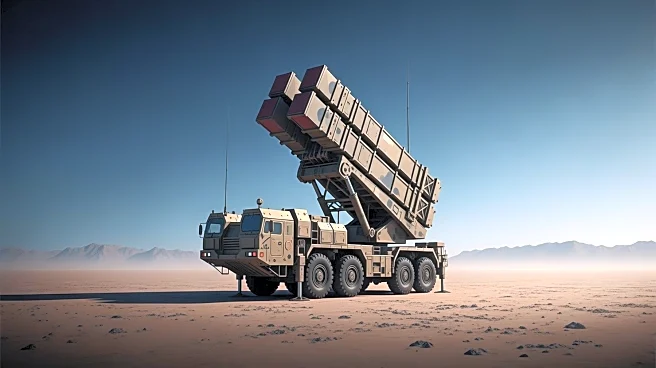What's Happening?
Iran is reportedly preparing to launch a significant number of missiles towards Israel, raising concerns about a potential new conflict. Despite President Trump's previous claims of having 'obliterated'
Iran's nuclear capabilities, regional officials suggest that Iran's nuclear program remains largely intact. The 2015 nuclear deal, which aimed to limit Iran's uranium enrichment, expired recently, and sanctions have been reinstated. Iran is believed to have relocated its uranium stockpile to a secret site and is developing a new enrichment facility. Additionally, Iran's missile factories are operating continuously, with plans to overwhelm Israeli defenses in any future conflict. Israel is urging China to halt shipments of sodium perchlorate, a chemical used in missile production, but China maintains that these exports are legal.
Why It's Important?
The escalating situation between Iran and Israel has significant implications for regional stability and international relations. Iran's missile preparations and nuclear capabilities pose a direct threat to Israel, potentially leading to military conflict. The lack of diplomatic negotiations and international oversight further exacerbates tensions. The involvement of China in supplying materials for missile production highlights the complexities of international trade and sanctions enforcement. The situation also affects U.S. foreign policy, as Arab nations strengthen ties with Washington, potentially influencing U.S. actions in the region. The ongoing debate within Iran regarding negotiations with the U.S. underscores the internal political challenges faced by the regime.
What's Next?
The potential for renewed conflict between Iran and Israel remains high, with both sides preparing for possible military engagement. The international community may face pressure to intervene or mediate to prevent escalation. The U.S. may need to reassess its diplomatic strategies in the Middle East, considering the shifting alliances and regional dynamics. The situation could lead to further sanctions or diplomatic efforts to curb Iran's missile and nuclear activities. The role of China in the supply chain may also come under scrutiny, potentially affecting international trade relations.
Beyond the Headlines
The situation raises ethical and legal questions regarding the enforcement of international sanctions and the role of global powers in regional conflicts. The potential humanitarian impact of a new conflict in the Middle East could be severe, affecting civilian populations and leading to displacement. The long-term implications for nuclear non-proliferation efforts are significant, as Iran's actions challenge the effectiveness of international agreements and oversight.









